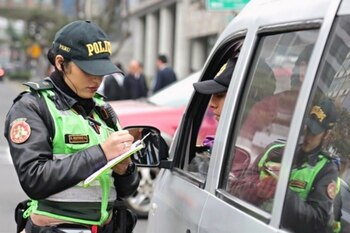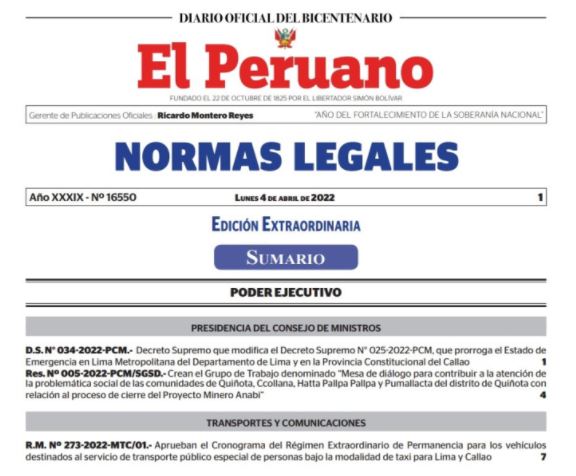
In the last hours of April 4 Pedro Castillo, president of Peru, announced the immobilization citizen as a measure to calm the national conflict that exists in Peru in the face the rise in prices of basic supplies in the family basket, the cost of fuel and, of course, the attack by criminals on supply stores. Likewise, the president made it clear that only some services (and also workers) will be able to transit, but then will it be necessary to process a work pass? This question and more will be answered in this note.
SOCIAL IMMOBILIZATION SCHEDULE
First we must be clear that the schedule of social immobilization is the day March 5 (today) from 02.00 a.m. to 23.59 p.m. This means that all people must stay at home during the time in question.
PLACES THAT MUST ABIDE BY THE MEASURE
During his message, the president did not make it clear whether this measure applies to Lima or to all of Peru; however, in the Supreme Decree officially published in the newspaper El Peruano, it is stated that the measure should be fulfilled only in Lima Metropolitan Lima in the department of Lima and in the Constitutional Province in Callao (and in the districts that make up those jurisdictions).
ABOUT THE LABOR PASS
It is not necessary to process the work pass, in the message expressed by the head of state he did not announce that it is necessary to process and carry it.
In addition, the page that was previously used (exactly in the time of pandemic) to apply for work passes has been disabled since January 31.
PERSONNEL WHO WILL BE ABLE TO MOBILIZE
In his message to the nation, the Peruvian president indicated that citizen irremovability would not affect the provision of essential services to all Peruvians, so those companies (and workers) that provide these services will be able to continue their activities.
According to Supreme Decree No. 034-2022-PCM amended prior to the presidential message, it states the following:
2.3. During compulsory social immobilization, strictly necessary personnel involved in the provision of health services, medicines, continuity of water, sanitation, electric power, gas, fuel, telecommunications and related activities, cleaning and collection of solid waste, funeral services, transportation of cargo and goods and related activities.
2.4. During compulsory social immobilization, pharmacies and pharmacies are allowed to provide care according to the norm of the subject.
2.5. The printed press, radio or television personnel may transit during the period of compulsory social immobilization provided that they carry their personal work pass, their respective journalistic credential and their National Identity Document for the purposes of identification. Authorization is also extensive for mobile units that transport them for the fulfillment of their function.
2.6. People who require urgent or emergency medical attention because they are at serious risk to their lives or health are also allowed to travel by private vehicle or pedestrian vehicle, as well as to purchase medicines.
2.7. Workers in the public and private sectors perform only remote work, in accordance with the relevant regulations”

BACKGROUND
It should be borne in mind that these measures are due to the shutdown of carriers at the national level, who have blocked the main transit routes, so that many transports do not reach their final destination, further raising the cost of the basic family basket. So far, 4 have died as a result of unemployment.
The riots have been mixed within the protests and many people have begun to take advantage of the anxiety of the moment to loot shops and mini-markets.
In the previous days, the Government announced that it had reached an agreement with the representatives (organizers) of unemployment. The first measure that would reassure the country was the “5-day agreement”, agreed with the guild of heavy-duty carriers, but collectives, taxi drivers and other river means continued the strike, demanding a new dialogue table with the authorities.
The Government then announced the exoneration of the Selective Consumption Tax (ISC) for 84- and 90-octane gasoline and oil. This was in order to reduce the price of fuel and food, but it was not enough and the unemployment continued.
WHAT ARE THEY ASKING FOR?
Users who indicate that they belong to the Union of Multimodal Transport Guilds, apart from the low cost of fuel, have openly requested regulations for cars in collective mode, and waiver of fines imposed during the pandemic season, as well as observation of upcoming work carrying out the Urban Transport Authority for Lima and Callao (ATU).
KEEP READING
Últimas Noticias
Debanhi Escobar: they secured the motel where she was found lifeless in a cistern

The oldest person in the world died at the age of 119

Macabre find in CDMX: they left a body bagged and tied in a taxi
The eagles of America will face Manchester City in a duel of legends. Here are the details

Why is it good to bring dogs out to know the world when they are puppies




